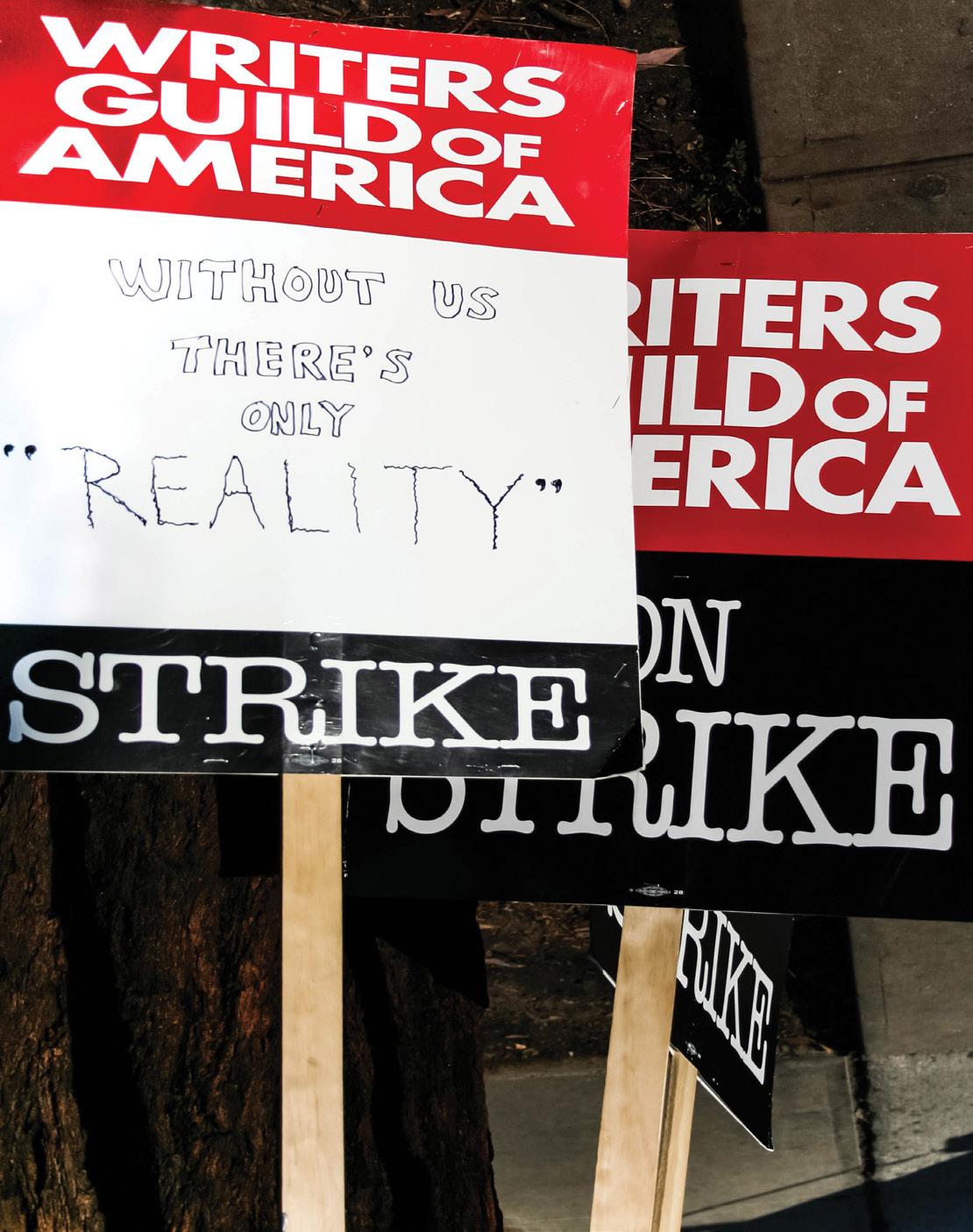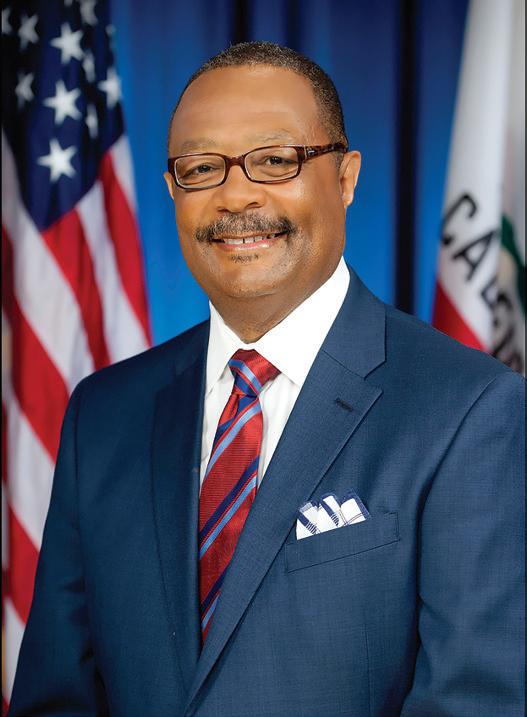
10 minute read
Hollywood writers to go on strike Tuesday after negotiations fail
by: Josh DuBose, Sandra Mitchell, Carlos Saucedo
Posted: May 1, 2023 / 05:33 PM PDT
Advertisement
Updated: May 1, 2023 / 09:43 PM PDT
The Lookout: Six Bills Call for More Responsible Policing, Safer Streets...continued notified of the reason t and would have an opportunity to defend themselves.
Cory Salzillo, Legislative Director of the California State Sheriff's Association, opposes AB 1090, claiming it undermines the electoral process.
“This is not good government,” said Salzillo. “This is disenfranchising voters.”
Explaining why the bill is needed, Jones-Sawyer said, “the bill provides counties with a meaningful tool to remove a sheriff for serious violations of the public trust.”
AB 1090 is currently under consideration in the Assembly Local Government Committee.
Assemblymember Rebecca Bauer-Kahan (D-Orinda) authored AB 1643. This bill would prohibit minors -- ages 12 to 17 years old -- from participating in a program of supervision unless the minor has committed an offense in which the restitution owed exceeds $5,000.” also require law enforcement agencies to have written FRT policies and maintain records of its use, which would be reported to the California State Auditor.
Proponents of AB 1643 clarified that this bill would allow minors to be eligible for diversion programs, and judges and probation departments will still have discretion.
AB 642 is not Ting's first attempt to restrict FRT. The lawmaker’s AB 1215 in 2019 temporarily banned the use of FRT in body cameras for three years. The American Civil Liberties Union (ACLU) expressed their opposition to AB 642 because the civil rights advocacy organization believes it does not go far enough.
"If it is intended to stop the civil rights disaster that is admittedly face recognition surveillance, it unfortunately backfires," said ACLU California Action Director of Government Affairs Carmen-Nicole Cox. "The recently authored amendments do not adequately protect against freedom from unreasonable government surveillance, wrongful seizure, or dissuade its misuse."
Commentary: Cinco de Mayo - A Celebration of Latinx Revindication in the U.S.
Anna Lee Mraz | Special to California Black Media Partners
Hollywood writers are now set to strike Tuesday as talks between the Writer’s Guild of America the Alliance of Motion Picture and Television Producers concluded Monday without an agreement. This will be the first WGA strike in more than 10 years with more than 11,000 television and film writers expected to walk off the job.
“You’re going to see picket signs going up in front of studios, in front of various other offices, as well as you’re going to start seeing a number of shows shut down instantly,” Deadline
Hollywood Senior Editor
Dominic Patten told KTLA.
WGA and AMPTP have been in talks for more than a month, with writers pushing for better base pay and an increase in residual money, saying that half of all writers are currently earning scale – the bare minimum of their contract. They also want higher contributions to their pension plan and health fund.
Television and film executives, on the other hand, say they are still recovering from pandemic losses and have put a lot of money into streaming content.
“The decision (to strike) was made following six weeks of negotiating with Netflix, Amazon, Apple, Disney, Warner Brothers, NBC Universal, Paramount, and Sony under the umbrella of the AMPTP,” the WGA said in a statement. Though our Negotiating Committee began this process intent on making a fair deal, the studios’ responses have been wholly insufficient given the existential crisis writers are facing.”
WGA’s negotiating committee unanimously rejected the AMPTP’s final offer and recommended to the WGAW Board and WGAE Council that a strike order be issued, the statement continued.
“The studios who have been making billions and billions and billions, they say they can’t do it.
‘We’re cutting jobs, we’re cutting content,’ but of course, a lot of that is to please Wall Street and their stock. These are still very profitable companies,” Patten said.
Viewing audiences will see an almost instant impact with latenight shows in reruns starting Tuesday. If it drags on, scripted shows will be affected, and next season’s network shows could be delayed or canceled.
The Lookout: Six Bills Call for More Responsible Policing, Safer Streets
Aldon Thomas Stiles | California Black Media owners would need to confirm possession of all their registered weapons when purchasing a new gun.
Watching your tax dollars, elected officials and legislation that affects you.
Jones-Sawyer maintains “many firearms are not reported missing or stolen until they have been used in a crime."
Daniel Reid, western regional director of the National Rifle Association (NRA), has voiced his organization's opposition to AB 574.
This bill is part of California's broader effort to reform its criminal justice system by prioritizing rehabilitation over punishment.
Supporters of this bill say one of its goals is to avoid the trauma and stigma associated with youth who go through the criminal justice system.
Last week, the Assembly Appropriations Committee postponed a hearing on the bill.
AB 642, introduced by Assemblymember Phil Ting (D-San Francisco), would limit the use of facial recognition technology (FRT) by law enforcement in felony arrests and prevent individuals from being stopped based on FRT information. The bill would
Another bill Ting introduced, AB 645, authorizes a fiveyear pilot program that would temporarily legalize speed enforcement cameras in six California cities: Los Angeles, San Jose, Oakland, Glendale, Long Beach and San Francisco.
“My city of San Francisco is committed to reducing traffic fatalities to zero,” Ting said in a press release. “More than 70% of our city’s fatalities occur on just 12% of our streets.”
The pedestrian advocacy group Walk San Francisco has been a vocal supporter of AB 645 while other organizations like the American Civil Liberties Union have strongly opposed it, citing its encroachment on privacy rights.
The Assembly Committee on Privacy and Consumer Protection voted to approve AB 645 and has referred it to the Appropriations continued on page 7
The fifth of May, Cinco de Mayo, is a holiday that celebrates the Battle of Puebla, which took place in 1862 near the Mexican city of Puebla. On this day, the Mexican army, led by General Ignacio Zaragoza, defeated the French in their attempt to take over the country.
While this date is not widely celebrated in Mexico, except for perhaps in Puebla itself, it has become a popular holiday in the United States.
It’s a common misconception that Cinco de Mayo celebrates Mexico’s independence. In fact, Mexico’s Independence Day is celebrated on September 16th.
In 1867, five years after the Mexican army’s victory over the French forces at Puebla, the triumph was first celebrated in the United States, in Texas where General Zaragoza was born. Later in 1930, the Mexican consulate in Los Angeles held an official celebration that helped establish the identity of the Mexican and Latin American community in the United States.

During the 1960s and 1970s, the celebration of Cinco de Mayo gained popularity in the United States due to the efforts of the Chicano movement. This movement fought for the civil and human rights of Mexican
Americans and played an important role in structuring the Civil Rights Act of 1964. Celebrating Cinco de Mayo became a way for the Mexican American community to assert their identity and say “We, Mexicans, are here. This is us. We speak Spanish and this is how we celebrate.”
In 1980, as the Chicano movement was gaining momentum, U.S. beer companies began to market Cinco de Mayo through advertising campaigns that encouraged the community to celebrate their identity by consuming their products.
Subsequently, other companies followed suit giving a twist to the meaning of the celebration and redefining it as a celebration of Mexican culture in the United States. As a result, while Cinco de Mayo is now widely celebrated, many people who participate in the festivities are unaware of its origins.
Cinco de Mayo has evolved to become not only a celebration of Mexican culture but also a symbol of the struggle and unity of all oppressed migrant and Latino communities.
This date is typically celebrated with large festivities that feature continued on page 6
Despite Protests, No FCC Movement on Vote for Standard General-TEGNA Deal...continued from page 1
General and Tegna is founded not in future promise but on past record and a corporate culture that reflects the American ideals of Diversity, Equity and Inclusion,” the letter said. “It is founded on Soo Kim’s personal and professional commitment to Diversity, Equity and Inclusion and his vision to enlarge the footprint of people of color in broadcast media.”
No community has a greater interest in the diversification of America’s broadcast media than African Americans, Foy added.
“We have long sought and fought for expanded access to ownership, administration, operational, programmatic opportunities within the television broadcast industry,” he said. [Kim’s] new company will operationalize a robust and rigorous vision of inclusion and industrial scale access for Communities of Color, writ large, but specifically to the Black community which through long suffering and moral fortitude has long sought and fought for.” concerns and opposition in a guest column in Broadcasting and Cable. FCC scrutiny, he said, is necessary to safeguard local news coverage in an era when TV and radio stations, as well as newspapers, are being snapped up by hedge funds and other news outlets are being shuttered at an alarming rate.
“We have already seen the detrimental effects that Wall Street control of local journalism produces — news deserts for local communities created by consolidation and even increases in government costs as a result of the lack of scrutiny over local deals,” Braico said. “Now, Wall Street funds like Apollo Global Management have turned their attention to broadcast TV, and it is crucial to determine if the Standard General-Tegna megamerger will serve the public interest, and not reduce coverage of local issues, impose viewpoints that are out of step with the community, or put jobs in local newsrooms at risk.”
American-owned or controlled stations from 4 to 65.
Outside the Federal Communications Commission building, Korean and AfricanAmerican protestors wearing black T-shirts with white lettering saying, “HOLD A VOTE,” stood resolutely in the cool morning. Charles Yoon walked down the line shaking each demonstrators’ hand while bowing deeply.
“Soo Kim has been a leader in the Korean community for a long time. He is an expert in diversity. This expansion is very important for the community at large,” said Yoon, president of the Korean American Association of Greater New York. “I came to support the deal because it would be very important to increase diversity.” as the chair, has the prerogative to bring the issue to a vote, and even though at least two commissioners desire a vote, whether that happens is out of their hands. Meanwhile, the FCC has come under intense criticism for seeming to be going against its declared support for diversity. Carr, for his part, said he’s concerned about the delay because of the message it sends.
Yoon, an attorney who traveled with protestors on a bus from New York, said he understood that the proposed merger has not been voted on and that its fate is in the hands of an administrative judge.
“I believe the application deserves a straight up-and-down vote. Diversity is important. The FCC should remove any impediments,” said Carr, the senior Republican on the FCC who once served as the agency’s general counsel.
“It’s been a year-long process. Local news is sputtering by the moment.”
With that reality, Carr said, the FCC needs to create incentives and inducements, adding that this deal – if approved – would represent “a really break-glass moment.”
The California Legislature is currently considering several bills related to gun safety, criminal justice, and police accountability.
Several of these bills have already been approved by the Assembly Safety Committee and are now under review by other legislative committees. If passed, they could affect policing in your community, juvenile arrests and rights, tickets for traffic violations, and state policy around gun ownership.
Public Safety Committee
Chair Assemblymember Reggie Jones-Sawyer (D-Los Angeles) authored Assembly Bill (AB) 574. Under the proposed bill, gun

"We feel like the bill lacks clarity," said Reid. "If the firearm can't go without a 'yes' answer you have a Fifth Amendment issue. It violates your right against self-incrimination.
People can't be compelled to incriminate themselves if they are in violation of this law."
The Assembly Appropriations Committee is currently reviewing AB 574. A hearing date has not yet been set.
Jones-Sawyer has also introduced AB 1090. It would allow a board of supervisors to remove an elected sheriff with a four-fifths vote.
The bill states that sheriffs facing removal would be
But there is substantial and significant opposition from critics ranging from other media entities and unions such as the National Association of Broadcast Employees and Technicians (NABET)-CWA and The NewsGuild-CWA which filed a petition to dismiss or deny the deal with the FCC last year. Union officials contend that an “unprecedented array of sequenced transactions and swaps” — are actually an attempt to “game the Commission’s ownership and retransmission consent rules in ways that contravene the Commission’s public interest standard,” according to a June 22, 2022, Broadcasting and Cable story.
Charlie Braico, head of NABET-CWA, presented his
More than 80 percent of Americans say they find local news coverage on television and radio to be most trustworthy, Braico added.
“We must not violate that trust by ceding control of local news to a handful of hedge funds,” he asserted.
In February last year, Tegna, which owns 64 television stations in 51 US markets, agreed to be acquired by Standard General for $8.6 billion, including debt. Supporters point to the potential benefits including a 300 percent increase of minority-owned or controlled commercial fullpower television stations; expansion of the number of minority-owned commercial full-power television stations in the US from 24 to 85; and a surge in the number of Asian-
“I hope we show the FCC how much we care,” he said.
Inside the meeting, four FCC commissioners – closely watched by almost a dozen protestors – went through a five-item agenda. At the end of the hearing, in a Q&A with the media, Commission Chair Jessica Rosenworchel tried to explain why the Standard General-TEGNA question had not yet been put to a vote.
She said the transaction is currently the subject of litigation and is before an administrative law judge and therefore she’s prohibited from talking about it. But Rosenworchel did say that she firmly believes “that diversity of the media needs to reflect the diversity of this country.”
When asked, Commissioner Brendan Carr said Rosenworchel,
“Hundreds of local newspapers have shut down over the last few years alone. This trend is part of a broader decline in the investments necessary to sustain the journalists and reporters that are vital to communities across the country,” he said in a Feb 24, 2023, joint statement with Commissioner Nathan Simington after the public review. “Many of the nation’s local TV stations are trying to step up and expand their news gathering operations. At this moment, the FCC should be working to encourage more of the investment necessary for these local broadcasters to innovate and thrive. It does the opposite today. After a protracted, nearly yearlong review, the commission should be providing the parties with a decision on the merits –not an uncertain future.”






